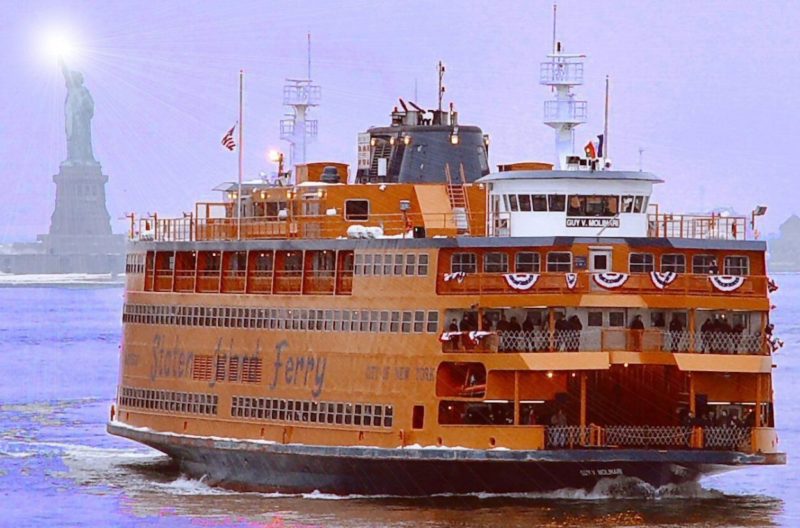The passenger vessel industry has weighed in with a list of suggestions to the federal government on federal regulations that should be dropped or revised.
In a letter to the Office of Information and Regulatory Affairs (OIRA) dated July 16, the Passenger Vessel Association outlined federal policies and rules that are hampering operations of U.S.-flagged passenger vessels, including dinner cruise vessels, sightseeing excursion boats, and car and passenger ferries.
The letter is in response to a request by the OIRA to identify “ways to reduce regulatory costs and restrictions on the American maritime industry.” It is part of the Trump administration’s broader initiative to streamline government and reduce agency oversight.
The public comment period closed July 16. The American Waterways Operators also submitted a list of rules that the inland barge industry would like to see changed.
PVA said that some of its proposals could be achieved without formal rulemaking procedures.
On the PVA’s wish list:
- Pulling back “excessive” radiotelephone inspection rules for passenger vessels operating in the Great Lakes. Currently these operators must have their vessel radiotelephones inspected every 13 months, while identical devices carried by passenger vessels sailing in other U.S. waters are inspected every five years. The Federal Communications Commission mandate has roots in an agreement between the U.S. and Canada that is 50 years old. “There might have been a legitimate safety reason for more frequent radiotelephone inspections on Great Lakes vessels 50 years ago, but advancements in communications technology have made radiotelephones far more durable than before,” PVA wrote, adding that there’s no safety or policy reasons to require inspections every 13 months. The current rule affects about 360 vessels in the Great Lakes, and PVA estimates that moving to a five-year inspection routine would save the industry $576 million over the five-year period.
- Eliminating the “burdensome” annual reporting requirement under the EPA’s Vessel General Permit for incidental discharges of wastewater. Currently operators are required to keep detailed records of how they handle discharges for Coast Guard review. The EPA also requires submission of an annual report. “This is redundant and does not substantively add to the environmental protection of the nation’s waters, nor does it add to the current environmental stewardship of vessel operators,” PVA stated.
- Exempting certain passenger vessel terminals from the TWIC (Transportation Worker Identification Credential) reader requirement. In 2016, the Coast Guard exempted nearly all passenger vessels from having to install TWIC card readers, determining that they posed low safety risks. The final rule that will go into effect on Aug. 18, however, states that any facility that receives a vessel carrying more than 1,000 passengers and a crew of 20 or less will have to carry the readers. PVA says this will affect about 20 terminals nationwide, such as those used by Staten Island Ferry, Washington State Ferries, and day sightseeing vessels in Detroit, Savannah, Ga., Nashville, Tenn., Cleveland and San Francisco. “PVA urges the Coast Guard to amend the current regulation to remove this inconsistency. There should be no TWIC reader requirement applied to a terminal that receives a ferry or day-cruise vessel with a capacity of more than 1,000 passengers but which has a complement of 20 or fewer individuals,” PVA wrote. “Changing the TWIC reader rule in this limited situation will not compromise security.”
- Amending the non-tank vessel response plan rule that covers training and exercise requirements. While the 2013 rule would not apply to the majority of passenger vessels, as they are less than 400 gross tons, it would hit several dozen domestic passenger-carrying vessels, according to PVA. “Unfortunately, these requirements are one size fits all,” regardless of vessel size. PVA said. “This was written specifically for operators of tank vessels and was not modified…it is clearly overkill when it is applied to the operator of a small passenger vessel.”
- Eliminating the requirement that a vessel operating on inland waters carry flares for emergency signaling, as this practice is “obsolete and outdated … Communications technologies such as radios, automatic identification systems and even cellphones have overtaken the need for flares.”
- Providing more flexibility to extend five-year drydock interval regulation.
- Changing the required interval to service inflatable buoyant apparatus, which are used for lifesaving, from once a year to once every two years. There is significant cost and difficult logistics to servicing such equipment and often the vessel is taken out of service for several days.
- Modernizing an outdated, 1950s first aid kit requirement for merchant vessels. The current rule “is no longer consistent with medical practice or availability,” and it is not necessary for the Coast Guard to mandate a single type of kit for all inspected merchant vessels. “The one-size fits all approach is too inflexible,” PVA stated.
- Formally changing inland navigation rules to allow vessels operating in the Western Rivers to use direct communications technologies rather than displaying shapes and lights. “With the widespread use of automatic identification systems (AIS), these shapes and lights are unnecessarily redundant and obsolete,” PVA said.




